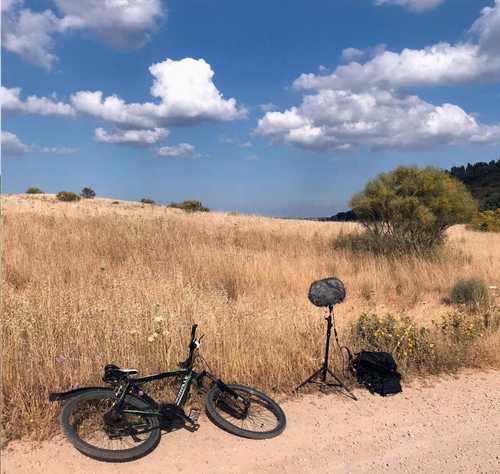
Three years in the countryside: Notes from a field recordist
Hoopoe, starling, golden oriole.
It’s an especially warm morning – a surprise after weeks of cloudy skies. I make an involuntary mental note of the birds outside, then, opening my eyes, see the sun’s colors coming in through the front windows. I never shut the curtains; I’ve always liked the natural light coming in. It usually gives an instant dose of joy.
I peek through the front window and am surprised and very happy to see not only the resident starling, but four others too. They’re singing and vocalizing intensely, clearly interacting with each other, and maybe with the warblers, too.
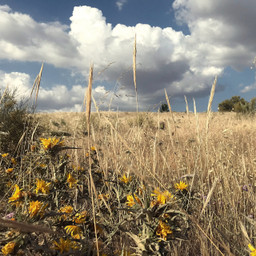
As the coffee brews, I open the front door while starting to do small morning tasks. Once the aroma of the coffee reaches my nostrils, I pour a mugful and sit on the front steps – my laziest and most familiar sitting-spot – to listen and watch.
Mimicries: kitten, tree frog, little owl, common buzzard, nightingale, red kite, golden oriole, fox alarm call, crow, and who knows what else I can’t recognize. If I lived for 300 years, I have no doubt I would still be impressed.
Then a golden oriole chimes in. There is a crystalline quality to this species’ call; when I hear them, I imagine a magic potion being poured into a lake. I listen to it against a more continuous background of great tits and warblers – and the frequent braying of a burro, which permeates the village and its surroundings.
During the summer vacation, this sound never ceases to impress tourists and often makes us, the locals, laugh: they play in the water and suddenly the donkey is everywhere, echoing through the whole village, tricking people with an illusionary proximity, stronger than the church bells and almost as frequent. As I write, it vocalizes as if it knows what I’m typing.
Coming from a grotesquely cacophonous city, life in the countryside was like the relief we experience when we turn off a vacuum cleaner or a food processor. That relief lifts some weight off of our bodies, leaving space for something else, something more subtle and delicate.
My coffee was just right, and while my eyes and ears are still focused on the spotless starlings (Sturnus unicolor), a couple of white storks fly by in the distance. What else could I ask for on a Sunday morning?
Since I moved here, this symphony – with slight variations – has been a gift every morning for three years. I arrived with no idea what to expect. I was told about the beauty of this place: the long summers, the big moon, the skies clear for stargazing, and the water all over the montado – a man-made landscape combining agriculture, forestry, and pastoralism.
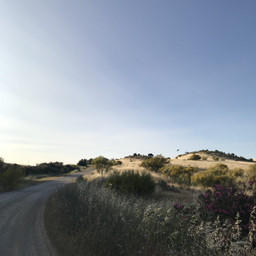
Little by little, I became elated by the quietness here. For me, it’s inseparable from this very notion of beauty. Coming from a grotesquely cacophonous city, life in the countryside was like the relief we experience when we turn off a vacuum cleaner or a food processor. That relief lifts some weight off of our bodies, leaving space for something else, something more subtle and delicate.
I’ve often reflected on how the countryside can coax our lives into a more grounded state (especially compared to a busy city). This not only depends on the sonic environment, but on the sense of community. People know each other – to different degrees, but with an abiding familiarity – and are extremely generous in authentic, spontaneous ways.
The first time I spoke to the lady who helps her aging sister settle in for the night next door, every evening, I was also sitting on the doorsteps. All of a sudden, she paused with her hand on my knee, and took a jar of kidney beans from her grocery bag, asking, ‘Do you like these?’ Though grateful, I attempted to refuse this food she had bought herself, but she just said, ‘Sssshhhh. Keep it.’
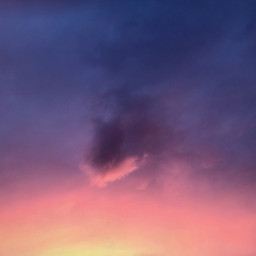
I often hear the rapping of knuckles on the kitchen window, soft but resolute. People here use the window more than the door. This is another neighbor, proud and full of love for his productive orchard and garden. Several times each month, during the season, he distributes literal bucketfuls of freshly picked fruit and veg among the neighbors. ‘No fertilizers, no chemicals; they’re delicious. Mmmmm, if you cut this finely…’ – proceeding to share some delicacy, one hand over his belly, with a satisfied smile and dreamer’s eyes. ‘You might find many slugs in there; it’s a good sign.’
And I do, and I have to spend time with this food, lovingly grown and hand-picked just a couple of hundred meters from my door. Next time I see him, I’ll say the celery was amazing and full of flavor – the exact opposite of pre-washed, plastic-packaged, sly greens bought in a supermarket.
It’s crucially important to lend a friendly ear – and, when done sincerely, it’s the simplest, most honest pathway to friendship here. Behind the walls covered with vivacious fuchsia flowers, there are people with many decades of history and memories to share. But being here has made me really understand how little aging people are honored, or properly taken care of, in our capitalist system. They are forgotten and seen as a burden, which saddens and worries me, for they have lived through the fascist Estado Novo dictatorship and the Carnation Revolution which overthrew it. Their memories are priceless. They have lived through many changes which the younger generations now take for granted. They need to be listened to with utmost respect and attentiveness.
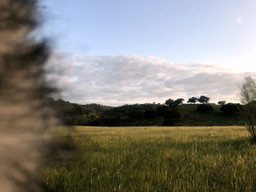
Of course, the younger people have faced significant changes, too – for example, seeing the most important places of their childhood disappear. A river where boys’ fathers and uncles taught them to swim and catch fish by hand from beneath the rocks, an essential part of the village’s identity, is now lost under the waters of the dam. It can no longer be heard trickling from the village center, or seen flooding and rushing in the winter.
For me, hearing about the river is akin to listening to countless Tom Sawyer-like stories – but they come with a heavy sadness for the storytellers. It’s a loss; it’s solstagia: the emotional distress caused by environmental change. ‘I really wish that you could see this like it was before’: a sentence I’ve heard dozens of times by now.
The women who walked and ran barefoot over fields of flowers say that the scenery is very different now. ‘We didn’t even have shoes back then; we were very poor. But we didn’t care. I still love animals very much and feed a fox that comes into my yard. I see God in animals and nature.’

Yet there is still so much land to walk that sometimes the horizon seems infinite. And the land can tell stories itself: non-native eucalyptus rustling in the wind, so different from the cork trees. Though historically important for the regional economy, Quercus suber and rotundifolia are also being replaced by organized plantations of olive trees
Despite the geometric beauty of its soft, rounded fields, this land has been sold off, privatized, and reduced to a negligible layer of dusty dirt. What will happen next?
Before this became so immediate to me, I thought these losses were happening far away. Now I know better.
I’m more politically informed, beyond institutional documentation and methodologies, but, here, I also listen directly to people’s hearts. And that has made me aware of the grave possibility that the local oral history may be forgotten if no one is there to listen, if we don’t make time to do so.
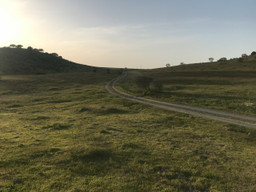
What is landscape but a reflection of the lives of those who live in it, including their pain and their joy? This place is where your oranges come from, whose quality directly speaks to the climatic conditions of the season – unlike those shining spotlessly on the supermarket shelf. It’s where the elderly generation heard the last wolves howling. Now, we can only imagine the immensity of the hills lamenting its ruthless persecution. It’s through this land that I came to understand the region’s habits and traditions, toxic masculinity, prejudices and political rebellion; I’ve come to see all that in people, but also their capacity for love and generosity. When I mingle and listen to them, I learn local words, expressions, and names for bird species – and, most of all, a sense of belonging to a place: walking the land which nurtures the animals and food that feed families.
I understand now that appearances and external achievements are merely noise if, before everything else, you aren’t a good neighbor.
In a small, interdependent community, even career highlights are externalities. I understand, now, that we should nurture and take care of our immediate surroundings before rushing to parts of the planet we’ve never visited before. Listening is also opening our hearts and letting go of part of our egos, because we see parts of ourselves in others.
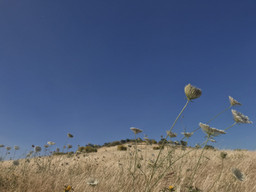
I still visit a spot I’ve always loved, which hasn’t been spoiled. I see it change with the seasons, from a rich green with thousands upon thousands of fragrant little flowers – lilac, yellow and white, mainly, with occasional tulips always standing out – to yellowed, dry weeds resisting the typical 104 °F (40 °C) summer heat. Here, I found solace. I’ve bathed there; laughed; cried; grieved; gazed at the pink sky, the moon, the Milky Way, and counted falling stars; shared love secrets; and whispered with a friend while her baby slept in her arms.
The quiet is so comfortable that we don’t want to break it, so we speak softly in reverence.
I wanted to share something special with them so I brought my recording gear and placed it a few meters away from us, pointing towards the edge of the lake. I drew the cables in and placed headphones on my friend’s head.
She listened for a long time, then, very tenderly: ‘Wow! I hear many layers. It’s like I see the landscape but hear beyond it – and that tells me a story.’
All photos courtesy of Melissa Pons
Earth.fm is a completely free streaming service of 1000+ nature sounds from around the world, offering natural soundscapes and guided meditations for people who wish to listen to nature, relax, and become more connected. Launched in 2022, Earth.fm is a non-profit and a 1% for the Planet Environmental Partner.
Check out our recordings of nature ambience from sound recordists and artists spanning the globe, our thematic playlists of immersive soundscapes and our Wind Is the Original Radio podcast.
You can join the Earth.fm family by signing up for our newsletter of weekly inspiration for your precious ears, or become a member to enjoy the extra Earth.fm features and goodies and support us on our mission.
Subscription fees contribute to growing our library of authentic nature sounds, research into topics like noise pollution and the connection between nature and mental wellbeing, as well as funding grants that support emerging nature sound recordists from underprivileged communities.
